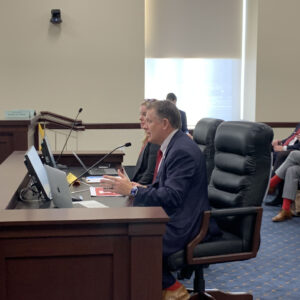
Utah’s annual 45-day law-making session begins on Jan. 21. During this month and a half, hundreds of bills will be passed, important tax decisions made and the state’s annual budget approved.
Playing a key role behind the scenes will be interns from colleges and universities around the state, including the University of Utah.
“There’s just no better way to understand the legislature than actually being there,” said Naphtali Garcia Arana, who interned in the Senate last year. “As a political science student, a lot of my studies feel very theoretical and I don’t always understand how everything applies. However, being part of the legislative session allowed me to see how everything I have learned in class applies in the world.”
Individual members of Utah’s part-time legislature do not have any full-time staff, making the work of student interns crucial. In addition to supporting members of the House and Senate, interns also work with other entities such as the Governor’s Office, lobbying firms, advocacy groups and more.
“Before I interned at the legislature, I didn’t realize how many people come to the hill during the session to advocate for their position,” said Arden Cook, a 2024 state legislative intern studying political science. “Sometimes lobbying gets discussed as if it’s only negative. But once you witness it first hand, you see how lobbying is often just a conversation where someone shares the stance of specific stakeholders with an elected official.”

Thanks to School House Rock, many people understand the general process of passing a law. Legislation begins as an idea, is drafted, introduced into the House or Senate and then considered by a committee. If the committee approves the bill, the legislative body where it was introduced votes on it. If that body passes it, the process begins again in the other body. If the House and Senate approve the bill, the governor can sign it into law or veto it.
While this is true, a lot is happening throughout the process that it doesn’t cover. As a public institution, the U relies on funding from the state. Each year, the university president presents to the State Higher Education Appropriations Subcommittee about the school’s successes, ongoing initiatives and new programs. University leadership may also request funding for needs like new buildings or resources for student support.
“When you get to witness the process up close, you see how many things are just decided by a conversation,” said Cook. “A phone call from a constituent can completely shift a lawmaker’s perspective.”
In addition to this annual presentation, university leadership engages with lawmakers in other ways during the session. This may include advising on issues related to the institution’s research expertise, private conversations with lawmakers about bills or testifying during public comment about legislation that would impact the U.

“Public comment is public,” Garcia Arana said. “Everyone has the right to go up to the Capitol and say what they want to say.”
University of Utah employees who wish to engage with the legislative process have the free speech right to do so. They must adhere to the state’s executive order and Utah System of Higher Education policy on “legislative communications,” to ensure it is clear they are representing their personal interests and views and not the university’s, unless a specific exception has been given by university leadership. More information can be found in the Spring 2025 Annual Notification.
“I think that it’s really important for students of all backgrounds to have a presence on the hill,” Garcia Arana said.
Once the legislative session is complete, the university’s general council reviews the laws that impact the U and analyzes what the school needs to do to comply. University leadership implements policy to adhere to new requirements. Because this process takes time, new legislation often does not go into effect until a few months after the legislative session concludes.
To follow what is happening during the legislative session, sign up for a newsletter such as Utah Policy, track bills via the My Legislature page, and watch or listen to “The Hinckley Report.” Check attheu.utah.edu for legislative updates related to the U.
Learn more about and apply to Hinckley internships here.
